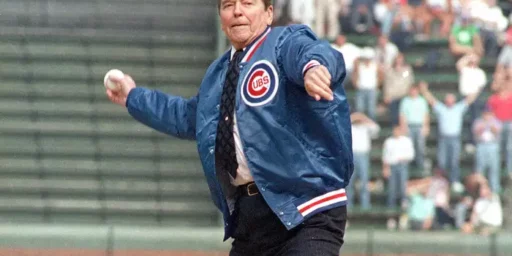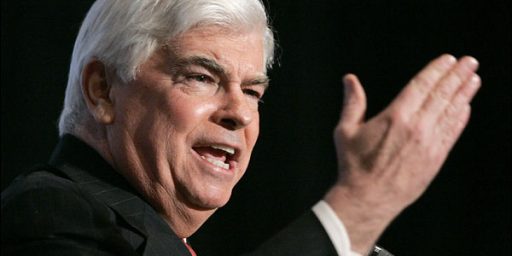Candidate Expiration Dates
Dodd Harris observes that, among the many advantages President Bush has going for him in a re-election contest against Senator John Kerry is Jonathan Rauch’s Rule of 14:
As every grocer knows, many products have sell-by dates. Bread lasts a day or two, milk maybe a week. Well, presidential aspirants have a sell-by date, too. They last 14 years.
Herewith, Rauch’s Rule. Actually, it was pointed out to me by a young political genius named—but I can’t tell you his name, because he works in a government job and asked me to keep his name out of my article. Sadly, I must myself take credit for the Law of 14:
With only one exception since the presidency of Theodore Roosevelt, no one has been elected president who took more than 14 years to climb from his first major elective office to election as either president or vice president.
George W. Bush took six years. Bill Clinton, 14. George H.W. Bush, 14 (to the vice presidency). Ronald Reagan, 14. Jimmy Carter, six. Richard Nixon, six (to vice president). John Kennedy, 14. Dwight Eisenhower, zero. Harry Truman, 10 (to vice president). Franklin Roosevelt, four. Herbert Hoover, zero. Calvin Coolidge, four. Warren Harding, six. Woodrow Wilson, two. William Howard Taft, zero. Theodore Roosevelt, two (to vice president). The one exception: Lyndon Johnson’s 23 years from his first House victory to the vice presidency.
Wait a minute: zero? Right. The rule is a maximum, not a minimum. Generals and other famous personages can go straight to the top. But if a politician first runs for some other major office, the 14-year clock starts ticking.
Very interesting. Indeed, while we tend to think of presidents as wise old men who have climbed steadily to the top, they are much more often simply powerful personalities that catch on rather quickly.






Dunno, James. This theory makes me think of the old record from the ’60s, drawing all the parallels between Kennedy and Lincoln. Even though the quote cites 16 examples (plus one exception), it still seems like a stretch. Especially with the inclusion of four parenthetical “to Vice President” remarks.
Such a small statistical universe. It looks compelling at first glance, but I’m always wary of drawing rules from observation, even moreso when there’s such a small sample.
JAJ,
I don’t think it’s an iron law. But he makes a pretty good case; read the whole article. Indeed, as he points out, being Veep suspends the clock–but no Veep but LBJ made it to Prez in more than 14 years from getting elected to major office if the Veep years are subtracted.
And the universe of candidates who sought the presidency in the last 100-plus years is much larger than those elected.
Ah, the pitfalls of statistics. I neglected the part of the universe that got filtered out.
What struck me was that two of our famously ‘young’ presidents, Clinton and Kennedy, were at the outer boundary of this rule.
Commissar: The same thing struck me, especially with JFK. Clinton was a boy governor–he got elected at age 32, I think. But JFK was definitely in the House much longer than I had thought.
That’s funny, when I mailed this to you about 2 months ago you strongly discounted it. Go Figure.
One assumes that LBJ, and Gerald Ford, fall outside the rule because they were accidental (unelected) Presidents. (True, LBJ won re-election in 1964, but he would never have been elected otherwise, as his campaign in 1960 showed.)
Randy,
Right. Indeed, Ford doesn’t count since he wasn’t elected in his own right. And had JFK not been killed, the first chance LBJ would have had to run again was 1968, when he’d have likely been too old.